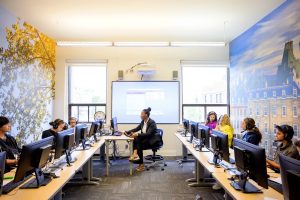This school year, the Greater Clark County School district in Kentucky decided that teachers would now be conducting e-learning days when school is closed for winter weather. Many instructors in the district found the virtual school day to be beneficial.
| "TowPlow truck on rural Interstate in Missouri" by SnowKing1 is licensed under CC BY-NC-SA 4.0 |
Megan Roger, an ESL teacher in the district commented, “We want them to have that practice on a regular basis because, if you don’t use a language, you can easily forget it. Even the smallest pieces that they’ve gained, they can lose if they’re not here for several days.”
Also finding benefit to the program, Emily Carpenter noted that many times teachers need to cram material into the end of the year due to all of the missed days. She said, “Thankfully with e-learning, I get to still teach the things they’re learning right then and there rather than at the end of the year, just keep extending that stuff because, that’s not the information they missed.”
In Pennsylvania, this is the case as well. Governor Wolf and the Pennsylvania Senate passed Senate Bill 440 which allows schools to use 5 snow days as instructional days if the school uses technology on snow days.
Certainly every time we have snow days in my district, I find myself struggling to get myself and my students back on track and have to spend an extra day or two to re-teach what we had learned before the snow day, turning a one-day lesson into a three- or four-day lesson. I definitely see the value in continuing the learning on days where school is interrupted. My big hesitation is for the student who does not have the best home life, for the student who does not have internet at home, or for the student with learning disabilities who needs extra guidance to actually complete work in the first place.
This initiative seems like it has good intentions, but I think there is still some work to be done in perfecting it.
This initiative seems like it has good intentions, but I think there is still some work to be done in perfecting it.



